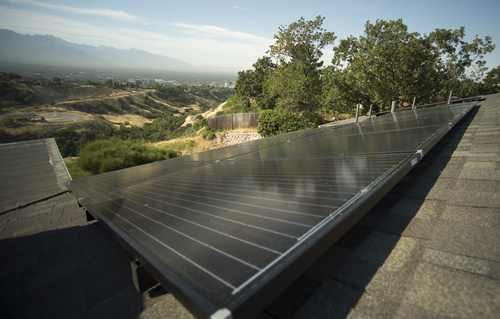This is an archived article that was published on sltrib.com in 2014, and information in the article may be outdated. It is provided only for personal research purposes and may not be reprinted.
The Utah Public Service Commission made what a football coach might describe as a good no-call Friday when it ruled that, for now, Rocky Mountain Power will not be allowed to assess an extra fee for customers with their own solar generating systems.
That doesn't mean that the dominant provider of electricity to Utah homes and businesses will never be allowed to add the $4.65 monthly surcharge to customers with net metering. That's a system where customers with their own generating systems can produce some of their own power and sell any excess juice they have back to the utility.
It just means that RMP had fallen short, far short, of the proper standard of establishing that its proposed fee is, as required by law, "just and reasonable."
The regulated monopoly argued that the proposed fee was reasonable, because lower power consumption by solar power users deprives the company of revenue it needs, not just to generate or purchase power, but also to build and maintain all the polls, wires, transformers, billing systems, call centers and repair fleets that even the net-metering customers need unless they become totally off-the-grid self-sufficient.
And RMP also argued that the fee would be just, because it would not shift the remaining costs onto customers who have not gone solar.
Users and fans of solar energy countered that such a fee, even if it started out small, was an attempt by RMP to discourage the adoption of solar, wind and other alternative source of power. That personal investments in power generation took some of the burden of producing or purchasing power off of the utility's shoulders. That they were taking responsibility for reducing the flow of pollutants and greenhouse gases into the atmosphere, even as RMP continues to rely primarily on dirty fossil fuels.
Operating both in its own self-interest and by the traditional way of calculating such things, the power company wanted to figure only its own costs and benefits, as well as those that could arguably be allocated to different classes of customers. It did not, and will not, want to figure in the impact on the lungs, hearts and medical expenses of all Utahns who might benefit from even a slight reduction in RMP's reliance on coal and even natural gas.
The company has also failed to explain why it rewards, through rebates, those who save power by buying efficient appliances, but wants to penalize solar power early adopters.
RMP will have another chance to prove that its proposed fee is reasonable. It should have that chance. But the standard of proof should be very high indeed.



